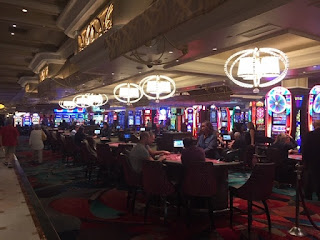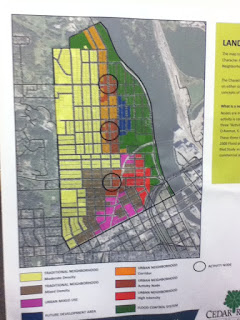 |
| Approximate location of proposed new middle school |
The Cedar Rapids Community School Board has approved the purchase of land in unincorporated Linn County, which they intend to be the site of a new middle school. As reported by Cindy Hadish in Homegrown Iowan, construction of the school is dependent upon the outcome of a bond referendum in November 2025, and is part of contracting the district's six middle schools down to four. The district argues contraction is necessary because of declining enrollments.
The school district operates under two mandates: to educate K-12 students, and to manage that in the most cost-effective way possible. As with the elementary school shuffle, they have argued that new construction offers the opportunity to keep up with technological developments in education, and that it is less costly to build than to repair. The choice of location is at first blush bizarre, but perhaps the district would argue that they need a lot of land that is relatively inexpensive. It seems relatively inaccessible, too, walkable from hardly anywhere other than the large-lot subdivision to its west. Even biking will be difficult for most students, despite the development of a trail alongside Highway 100. So we're in for a lot of private cars and school buses, with the latter costing district taxpayers maybe more than they're saving on the remote location. (For more on the complicated economics of school closings, see Roza and Dhammani 2024.)
While the district will retain middle schools in Wellington Heights (McKinley) and the near northwest side (Roosevelt), this also continues a trend of moving schools outward. The traditional neighborhoods near the center of town will become less attractive, which is for many reasons not in the city's long-term interest. That may not be one of the school district's mandates, but whose job is it?
 |
| Mayor Tiffany O'Donnell speaks at Bridge of Lions dedication, July 2022 |
Maybe it's the job of the city government, although in a fragmented system they have no pull with the school district. However, the city is busy pursuing its own risky would-be game-changers: a casino across the river from downtown, and not one but two data centers south of town (one is Google, one is "bigger than Google"). About the casino, I've argued that, arguments about morality and cost distribution notwithstanding, my biggest objection is that it's a terribly unproductive use of primo land. With a less splashy, more incremental approach, we could build a neighborhood that could be an ongoing supply of human energy to core businesses.
The political hype around bagging the data centers makes me suspicious, without a whole lot of personal knowledge of how they operate. Strong Towns lists data centers along with corporate headquarters and big-box stores as the 21st century equivalent of smokestack chasing: a self-defeating contest among localities, "betting big on bad hands" in the words of Strong Towns' John Pattison, in which both the winner and the also-rans wind up sad. (See also Mattera, Tarczynska, and LeRoy 2014.)
- Are we being overly optimistic about the economic impact of the firms' investments?
- How much tax revenue is the city foregoing to lure them?
- How much infrastructure investment and maintenance will be required to prepare the ground for their arrival?
- How much of our economy is going to be dependent on corporate decisions made far away?
- Realistically, how many and what type of jobs are these behemoths going to sustain?
- What about data centers' reputation for sucking up power and water, competing with local residents and existing businesses?
 |
| (Free clip art from getdrawings.com) |
All of us, including those who currently serve as city or school officials, have a stake in a city that is prosperous, equitable, and sustainable. I'd even include those who are in a position to profit from these investments.
A baseball slugger who constantly swings for the fences may be exciting to watch, particularly when he connects and belt one 500 feet. But the long string of strikeouts between blasts isn't fatal to him or his team. They'll live to play another day. If they decide Biff strikes out too much, they can find a new bopper. But a city that swings for the fences is playing a riskier game. Better to make consistent solid contact, and leave the excitement to the private sector. As such, I'd rather the new middle school be located on the proposed casino site, or some other in-town location; if we must have a casino, it go somewhere on the edge of town; and that we forego data centers altogether unless their impacts are paid for.
SEE ALSO: The latest Strong Towns video, produced by Ben Durham, is "Will a Factory Make This Small Town Rich?" (11 January 2025, 23:06):











